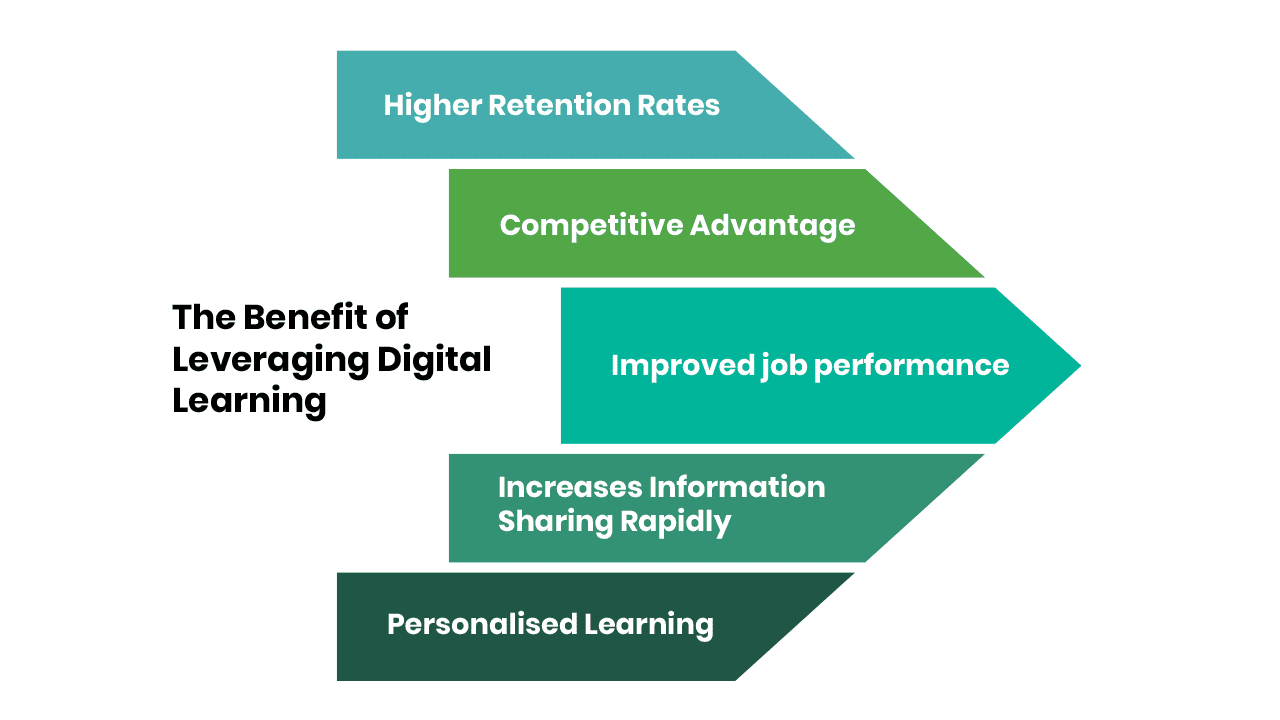In a world that is changing quickly, organisations increasingly recognise the role digital learning plays in shaping career development and employee retention. Digital learning is now acknowledged as a vital tool for learning, helping individuals take control of their professional development journey. It has reduced the traditional approach to learning that primarily relies on classroom instruction and printed materials. By leveraging digital learning platforms, learning materials and resources are easily accessible online, giving people the power to direct their career development. This will prepare them to succeed and survive in an increasingly competitive and dynamic job market.
A recent survey conducted on digital learning indicated that “digital learning is now widely recognised by institutions to provide positive learning experiences and learner choice, driving future innovation in practice and delivery, and, of course, survival in the new digital world as access to education becomes a global service.” (Solutionpath, experts in digital learning)
Leveraging Digital Learning in Organisations
With the rise of digital technology in all areas of our lives, here are a few examples of how organisations leverage digital learning as a powerful tool for career progression and employee retention:
- Investing in an LMS: Learning Management Systems (LMS) have since become an essential component of their learning strategy in many organisations. This technology makes it easy to distribute knowledge, monitor progress, and evaluate the skills and experience of the employees.
- Digitising Courses: Proprietary content (e.g. policies, procedures, onboarding, etc) can be digitised to address the organisation-specific learning needs of employees.
- Microlearning Modules: Short, bite-sized modules are becoming increasingly popular as they fit into employees’ busy schedules. These modules provide quick and targeted knowledge bursts. Organisations must ensure that the digital learning content they invest in provides microlearning assets.
- Occupational Learning Content: This allows employees to learn applicable skills for their role while in the workplace. Digital learning has expanded to include real-time resources, such as training videos or just-in-time information, allowing employees to learn while they work.
- Customised Learning Routes: Digital learning can provide employees with a customised learning path that guarantees they are exposed to the most appropriate material using data analysis and AI-driven recommendations.
The Benefit of Leveraging Digital Learning
Leveraging digital learning as a retention and career advancement strategy has several benefits. It inspires workers, instils a sense of devotion and loyalty to the organisation, and equips them with the necessary abilities to thrive in their chosen fields. Additionally, since they don’t have to travel to class to learn, it saves them much time. Employees can study whenever they want and finish their assignments from anywhere and at any time. They can even fail and try again without anyone prying on them. Digital learning has thus become an indispensable part of learning practices in any organisation, and it has redefined how employees engage in learning. Here are a few remarkable results to show how digital learning can be beneficial to employees:
- Higher Retention Rates: Employees who feel that their learning needs are met within the organisation are more likely to stay, reducing turnover rates.
- Competitive Advantage: Organisations that invest in digital learning gain a competitive edge by having a skilled and adaptable workforce that can respond to market changes effectively.
- Improved job performance: Digital learning empowers employees to do their jobs efficiently. It allows employees to improve their time management and set clear, achievable goals.
- Increases Information Sharing Rapidly: Digital learning establishes consistency in how employees consume and share information. It allows employees to access more information and enables them to tailor it specifically to their individual needs.
- Learning becomes personalised and tailored to individual employee needs, interests, and aptitudes to ensure that every employee achieves and reaches the highest standards possible in their career. Digital learning can help employees better understand the most effective teaching methods for them, making the delivery of teaching and learning more effective.
In a dynamic business world, digital learning is not just a fad but an important learning model that can drive positive changes in the workforce and foster career growth. Organisations that use digital learning for employee retention and career development are investing in their employees’ future and guaranteeing business success in a demanding and dynamic global market. The digital learning train is on the move, and it’s exciting, with many benefits for those who take advantage of it.
Our Commitment to Digital Learning
At Phillips Consulting, we are aware of the impact that digital learning can have on both employee retention and career development. With the right partnership with our clients, we have empowered their workforce with digital learning via our innovative learning platforms, engaging micro-learning modules, and bespoke e-learning courses. We continue to drive learning innovation to meet the demands of the modern workforce. Talk to us using digitallearning@phillipsconsulting.net to get started on this exciting journey.
Written by:
Saheed Fatai
Digital Content Experience Consultant
![]()

